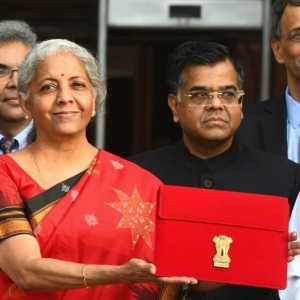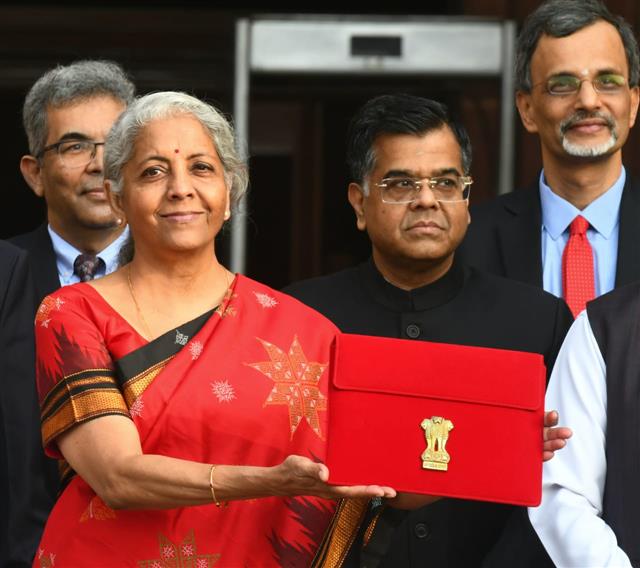
.png) Jaswant Kaur
Jaswant Kaur

Recall this scene from the famous movie "3 Idiots." Raju (Sharman Joshi) invites his friends Rancho (Aamir Khan) and Farhan (Madhavan) to his house. The film is suddenly transported to a black-and-white world, where Raju's mother is seen cooking food on a traditional chulha while his ailing father is lying down on a cot nearby.
As all three of them start eating, Raju's mother starts venting out her frustration, reflecting upon the financial distress the family faces. "Bhindi is now Rs. 12 per kilo... paneer, my son, will soon be sold in small plates at the Goldsmith's shop... Kammo is now 28. People are demanding a Maruti 800. How will she get married if you won't study well?"
The movie is a decade and a half old when essential food items and vegetables were much cheaper than today. Prices are skyrocketing. A kilogramme of any lentil is close to Rs 200. Forget vegetables; even coriander, used to garnish dishes, cannot be purchased cheaply in sufficient quantity.
The last week has been eventful. First, the farmers from three states started marching towards the national Capital with a handful of demands, focusing on financial security through a law promising a Minimum Support Price for all crops and higher wages under MNREGA with a minimum of 200 days of work.
Second, the Reserve Bank of India released the results of the consumer confidence survey. Looking at one key variable, the current situation index (CSI), urban and rural consumers are pessimistic about the market. The survey, based on responses from more than 6,000 respondents, covers parameters like the general economic situation, employment scenario, overall price situation, income, and expenditure across 19 major cities compared to the last year.
In other words, considering these variable factors, the results give an overview of how people feel compared to the last year. An analysis of consumer sentiments over the last decade shows that the highest consumer optimism was during November 2016. After that, the level of pessimism dipped, even to the level of 50 on the score of 0 to 100 during the pandemic.
Third, the government released a white paper to showcase its achievements during the last 10 years. Clearly intended to woo the general public just before elections, the paper claims that the previous decade under the NDA rule was much better than the UPA one. Of course, the paper does not mention inflation, unemployment, etc.
Amidst the glaring disconnect between the self-congratulatory narrative and repeated claims that India is growing at the fastest pace globally, the official growth estimates speak an entirely different story. Looking at the agriculture sector alone, its gross value added will grow 1.8 per cent in the current year, compared to 4 per cent in the previous year.
Not only this, but nearly 46 per cent of our population engaged in agriculture is experiencing low growth to the extent that the government had to promise free food to around 40 per cent of the people for the next five years. The fact remains that we as a country could register double-digit growth only under the UPA government rule.
Fourth, the long-pending electoral bonds case finally received a verdict from the Supreme Court. The court held these bonds violative of fundamental rights. It infringed on the right to information in the name of curbing black money and the principle of free and fair elections, besides promoting inequality. The court directed the bank to stop issuing electoral bonds immediately and also sought disclosure of the names of those who purchased these bonds.
Furthermore, the amendments made to various other laws for effecting these bonds, including the Income Tax Act, the Representation of Peoples Act, the Companies Act, etc., have been considered invalid. In fact, amendments in the Companies Act permitting unlimited political contributions by companies have been held as arbitrary and unconstitutional.
"Political contributors get access... this access leads to policy making... because of the nexus between money and voting. Financial support to political parties can lead to a quid pro quo arrangement," Chief Justice DY Chandrachud said, meaning corporate funding of political parties can include quid pro quo in policymaking -- so policies can be tweaked to favour the donors.
Courts have maintained that citizens have the right to hold the government to account. "A crucial aspect of the expansion of the right to information is that it is not confined to state affairs but also includes information necessary for participatory democracy," the Chief Justice added.
Association for Democratic Reforms reports that, since its introduction by the BJP government, a total of Rs. 16518 crore has been raised through electoral bonds. The biggest beneficiary has been the ruling party. This is not to rule out that other parties did not take any benefit. The money could have been used in various ways to influence public opinion. The BJP earned a massive Rs. 6564 crore from the bonds. Public money is being used to suit the political interests of people. The government spent an enormous amount on paying a commission to the State Bank of India and the Security Printing and Minting Corporation of India Ltd (SPMCIL).
The bonds were introduced with the claim of bringing transparency to political donations. However, the fact that the donor's name was never disclosed gave considerable leeway for people to divert their black money and donate it to their favourite party for their vested interests.
Unfortunately, those with political clout have amassed wealth and used public resources to suit their vested interests while the common man suffers. Unlike Raju's mother, who vents out her frustration, the farmers, daily wage workers, and small shopkeepers have no other way to express their anger but to protest.
However, how they are being treated with multi-level barricading and cemented roads with nails speaks volumes about the intention of those in power. Incidentally, these are the same annadatas (food providers) whose income the government wants to double by 2025 and whose name was mentioned several times by the finance minister in her budget speech recently.
"We need to focus on four major castes: 'Garib' (Poor), 'Mahilayen' (Women), 'Yuva' (Youth), and 'Annadata' (Farmer). Their needs, aspirations, and welfare are our highest priority. The country progresses when they progress. All four require and receive government support in their quest to better their lives," she said. Within 10 days of the Budget speech, we could see how the aspirations of the annadatas are being fulfilled. They are not even given a listening ear and forget any promise to address their concerns.